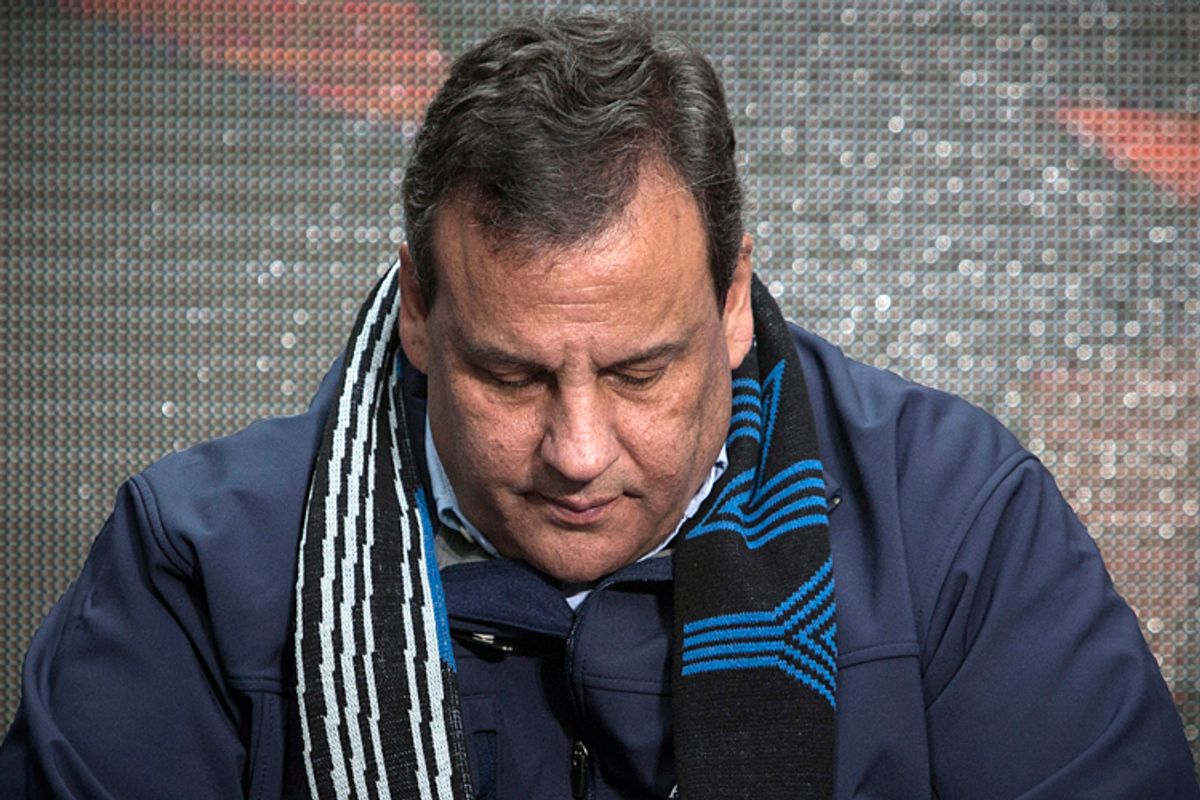We now know that in 2013, the administration of New Jersey Gov. Chris Christie at least twice used its executive powers of governance for political ends. The story that's received the most attention, of course, is high-level Christie aides calling for lane closures on the George Washington Bridge, possibly for political retribution against the mayor of Fort Lee. But another scandal received far less attention: the news that Christie called for a costly, self-motivated and unnecessary U.S. Senate special election just weeks before Election Day to boost his own vote percentage.
“Bridgegate” deserves all the attention it's gotten. But the story of the special election for New Jersey’s U.S. Senate seat, while lesser known, is also despicable. Sen. Frank Lautenberg died on June 3, 2013, and a special election was needed to elect someone to serve the remainder of Lautenberg’s term. U.S. Senate elections take time, especially when a primary election is also held. The logical solution for Gov. Christie was to hold the special election on Nov. 6, when New Jersey would already be voting for statewide offices.
But Christie didn’t like that idea. He was running for reelection as governor, and he did not want to appear on the same ballot as popular Democratic Senate candidate Cory Booker. Sharing a ballot with Booker was unlikely to lose Christie the election, as he held a commanding lead over challenger Barbara Buono, but it was likely to decrease his vote share. Christie’s presidential aspirations depended on a landslide reelection victory in blue-leaning New Jersey, and he wasn’t about to let an unexpected Senate election jeopardize that.
So Christie called for the special election to be held on Oct. 16 three weeks before Election Day. At the time of his decision, Christie said that “The costs associated with having the special election and primary, in my mind, cannot be measured against the value of having an elected member of the U.S. Senate. I don’t know what the costs are and quite frankly I don’t care.”
The idea that Christie valued having a new Democratic senator in Congress for three additional weeks above any amount of money is about as laughable as it sounds. In private, his advisers knew full well that the decision was a blatant, if clever, act of political maneuvering: as the New York Times recently reported, one said after the announcement that “We’re playing 3-D chess while [Democrats] are playing checkers.”
Still not convinced this was a scandal? There is a strong case to be made that last year’s New Jersey special election was the most unnecessary statewide election in American history.
Consider just how unprecedented this move was. In the century since the passage of the 17th amendment in April 1913, establishing popular vote elections for Senate, there have been 113 U.S. Senate special elections. Of those 113, 85 were held at the same time as congressional elections in an even year and three were held at the same time as gubernatorial elections in an odd year, so they did not require an additional election. An additional 14 were held in odd years when neither Congress nor a governor was being elected, because the time before the next regular election was too long to leave the seat vacant. Four more elections were held in January of even years, still long before the congressional elections, and two were held in December of even years after deaths of senators late in the election cycle. The remaining four were held in April, May, June and September of even years; three of the four occurred before 1920 and the other was held alongside a statewide party primary in June of 1960.
That leaves one outlier: New Jersey in October 2013, a gubernatorial election year. In sum, there has been only a single other Senate special election held between January and November in a statewide election year in the last 95 years (the 1960 election). The three U.S. Senate special elections that will occur this year will all be held in November in tandem with the midterm congressional elections.
As it happens, there are two good reasons why no one ever wants to hold statewide elections unless they really need to. First, statewide elections are very expensive. The special election last year cost New Jersey taxpayers some $12 million, and that’s not even including the productivity lost from the time voters had to spend getting to the polls and waiting in line to vote. (By way of comparison, Time magazine estimates that Bridgegate cost somewhere between $7 million and $21 million worth of hours of productivity lost.).
Second, an additional election has an obvious impact on voter turnout and voter understanding. It’s not a surprise that the special election in New Jersey had extraordinarily low turnout – just 24 percent of registered voters, which was lower than any general election in New Jersey history, including years when only the state Senate and state House were on the ballot. That dispersion of voter energy also contributed to a plunge in turnout during Christie’s reelection. The turnout on Election Day was less than 40 percent of registered voters, making it the lowest turnout for a gubernatorial election in state history and more than 7 percentage points lower than in Christie’s first win in 2009.
The special election scandal may seem boring compared to "Bridgegate," but its harmful effects on New Jerseyans were substantial. As a country, we need to hold politicians to account for their failure to govern elections with the interests of voters first. This failure has led to wanton gerrymandering, voter suppression laws, and a refusal on the part of both parties to support crucial electoral reforms unless it benefits their own electoral chances. Last fall, it also led to $12 million being wasted on a needless special election and low turnout in important elections for New Jersey’s Legislature and highest executive offices.



Shares